| Listing 1 - 10 of 1114 | << page >> |
Sort by
|
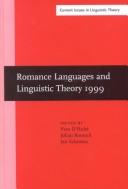
ISBN: 9027237298 9786613121547 1283121549 9027284393 9789027284396 9781283121545 6613121541 1588111318 9781588111319 9789027237293 Year: 2001 Publisher: Amsterdam Benjamins
Abstract | Keywords | Export | Availability | Bookmark
 Loading...
Loading...Choose an application
- Reference Manager
- EndNote
- RefWorks (Direct export to RefWorks)
This volume brings together a selection of articles presented at 'Going Romance' 1999. The articles focus on current syntactic and semantic issues in various Romance languages, including Catalan, French, Italian, Spanish, Portuguese, and a number of Northern Italian dialects. A large number of articles focus on negation, which was the theme of the workshop at Going Romance 1999, but other topics investigated include Wh- in situ, free relatives, exclamatives, lexical decomposition and thematic structure, unaccusative inversion, and temporal existential constructions. Most articles are comparative in nature, relating the different syntactic and semantic properties of both Romance and non-Romance languages to principles of Universal Grammar. The theoretical frameworks adopted in the various articles are diverse, ranging from the Principles and Parameters framework to HPSG.
Periodical
ISSN: 15811255 Year: 1991 Publisher: Ljubljana : Inštitut,
Abstract | Keywords | Export | Availability | Bookmark
 Loading...
Loading...Choose an application
- Reference Manager
- EndNote
- RefWorks (Direct export to RefWorks)
Slovenian language. --- Sloveens. --- Taalkunde.
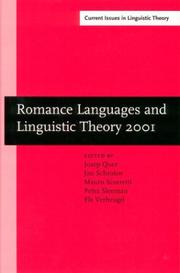
ISBN: 9027247579 9786613315755 1283315750 9027275262 9789027275264 9789027275264 9781588114457 1588114457 1588114457 9789027247575 9781283315753 6613315753 Year: 2003 Volume: 245 Publisher: Amsterdam Philadelphia J. Benjamins
Abstract | Keywords | Export | Availability | Bookmark
 Loading...
Loading...Choose an application
- Reference Manager
- EndNote
- RefWorks (Direct export to RefWorks)
The volumes Romance Languages and Linguistic Theory published in the series Current Issues in Linguistic Theory contain the selected papers of the Going Romance conferences, a major European annual discussion forum for theoretically relevant research on Romance languages. Romance Languages and Linguistic Theory 2001 is the third such volume. It presents a selection of the papers that have been presented at the occasion of Going Romance 2001 (XV) - which was held at the University of Amsterdam on December 6-8, 2001.
804 --- 804 Romaanse taalkunde --- Romaanse taalkunde --- Romance languages --- Congresses
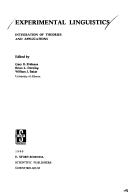
ISBN: 9064391645 9789027270863 9027270864 9789064391644 9064392129 9789064392122 1299927092 Year: 1980 Volume: 3 Publisher: Ghent Story-Scientia
Abstract | Keywords | Export | Availability | Bookmark
 Loading...
Loading...Choose an application
- Reference Manager
- EndNote
- RefWorks (Direct export to RefWorks)
In order to isolate the major perceptual dimensions involved in the recognition of selected English consonants, four experiments were conducted. The first experiment attempted to characterize the nature of the perceptual space for English consonants, while the second was a replication and extension of the first, with the results being analyzed using multidimensional scaling (MDS). The third experiment attempted to test the predictive validity of the original MDS interpretation. The fourth experiment was a preliminary investigation of the impact of the method of measuring perceptual proximity u
Linguistics, Experimental --- Anglais (langue) --- Engels --- Linguistique --- Taalkunde --- Linguistics --- 800 --- 800 Taalwetenschap. Taalkunde. Linguistiek --- Taalwetenschap. Taalkunde. Linguistiek --- Experimental linguistics --- Linguistics, Experimental.
Book
ISBN: 9789033489792 Year: 2013 Publisher: Leuven Acco
Abstract | Keywords | Export | Availability | Bookmark
 Loading...
Loading...Choose an application
- Reference Manager
- EndNote
- RefWorks (Direct export to RefWorks)
De morfologie is de wetenschappelijke studie van de structuur en de vorming van woorden. Dit boek biedt een beknopt maar systematisch overzicht van de basisbegrippen Morfologie die de taalkunde hanteert om die structuur te beschrijven en te bestuderen. Het boek veronderstelt geen taalkundige voorkennis en is bedoeld voor al wie grondig kennis wil maken met de verschillende aspecten van de woordstructuur van het Nederlands. Voor studenten Taalkunde of Logopedische en Audiologische Wetenschappen kan het fungeren als studiemateriaal bij een inleidende module Morfologie.
#KVHB:Morfologie --- morfologie --- 801.55 --- Academic collection --- taalkunde --- 801.55 Morfologie--(taalkunde) --- Morfologie--(taalkunde) --- Dutch language --- Grammar
Book
ISBN: 9780470658956 9780470658963 Year: 2015 Publisher: Chichester Wiley Blackwell
Abstract | Keywords | Export | Availability | Bookmark
 Loading...
Loading...Choose an application
- Reference Manager
- EndNote
- RefWorks (Direct export to RefWorks)
#KVHB:Taalkunde --- #KVHB:Taal --- #KVHB:Linguistiek --- Linguistics
Book
ISBN: 9027219028 9789027219022 Year: 1998 Volume: 1 Publisher: Amsterdam Benjamins
Abstract | Keywords | Export | Availability | Bookmark
 Loading...
Loading...Choose an application
- Reference Manager
- EndNote
- RefWorks (Direct export to RefWorks)
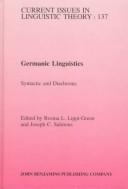
ISBN: 1283312573 9786613312570 9027276242 9789027276247 1556195923 9781556195921 9027236410 9789027236418 Year: 1996 Publisher: Amsterdam Benjamins
Abstract | Keywords | Export | Availability | Bookmark
 Loading...
Loading...Choose an application
- Reference Manager
- EndNote
- RefWorks (Direct export to RefWorks)
This volume contains ten revised and expanded papers selected from the dozens presented at the last Michigan-Berkeley Germanic Linguistics Roundtable, five contributions each from syntax (by Werner Abraham, Sarah Fagan, Isabella Barbier, John te Velde, and Ruth Lanouette) and historical linguistics (by Garry Davis and Gregory Iverson, Mary Niepokuj, Neil Jacobs, Edgar Polomé, and David Fertig).The authors start from current theoretical discussions in syntactic and diachronic research, using theory to address longstanding but still current problems in Germanic linguistics.
Germanic languages --- Teutonic languages --- Indo-European languages --- 803 --- Germaanse taalkunde --- 803 Germaanse taalkunde
Book
ISBN: 9789085716709 9085716705 Year: 2020 Publisher: Utrecht Veen Media
Abstract | Keywords | Export | Availability | Bookmark
 Loading...
Loading...Choose an application
- Reference Manager
- EndNote
- RefWorks (Direct export to RefWorks)
Talen zijn net diersoorten. Ze zijn niet onveranderlijk, maar passen zich in de loop der jaren aan. Overbodige woorden zoals 'flessenschraper' verdwijnen, nieuwe woorden zoals 'nepnieuws' ontstaan. Soms is er sprake van survival of the fittest. Kortom: talen evolueren. Was er ooit één oertaal? Waarom kunnen kinderen elke taal ter wereld vloeiend leren en hebben volwassenen daar veel moeite mee? Zit er een verborgen structuur in taal? In dit boekje maak je een reis langs de stamboom van alle talen op aarde, van de diepste wortel tot de kleinste uitschieter boven in het bladerdek.
Historical linguistics --- Indo-European languages --- taal --- taalkunde --- taalkunde$ --- taalevolutie --- Taalwetenschap ; geschiedenis --- Etymologie
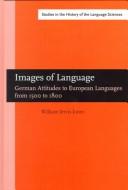
ISBN: 1283174707 9786613174703 9027283834 9789027283832 1556196334 9781556196331 9027245770 9789027245779 Year: 1999 Publisher: Amsterdam Philadelphia J. Benjamins
Abstract | Keywords | Export | Availability | Bookmark
 Loading...
Loading...Choose an application
- Reference Manager
- EndNote
- RefWorks (Direct export to RefWorks)
This volume consists of six essays on interrelated themes, focusing on key aspects of language reflection during the period 1500-1800, with particular emphasis on the seventeenth century. German speakers are seen attempting to discover and define the nature of adjacent languages, whilst also shaping and demarcating the identity and image of their native tongue.The first essay outlines and illustrates what European linguists believed, in an age before the advent of comparative philology, about the historical-genetic position of German within the circle of Classical and modern European lan
Language awareness --- Linguistic awareness --- Metalinguistic knowledge --- Awareness --- Psycholinguistics --- Europe --- Languages. --- 800 <09> --- 800 <09> Taalwetenschap. Taalkunde. Linguistiek--Geschiedenis van ... --- Taalwetenschap. Taalkunde. Linguistiek--Geschiedenis van ... --- Taalwetenschap. Taalkunde. Linguistiek--Geschiedenis van .. --- Taalwetenschap. Taalkunde. Linguistiek--Geschiedenis van . --- Taalwetenschap. Taalkunde. Linguistiek--Geschiedenis van
| Listing 1 - 10 of 1114 | << page >> |
Sort by
|

 Search
Search Feedback
Feedback About UniCat
About UniCat  Help
Help News
News